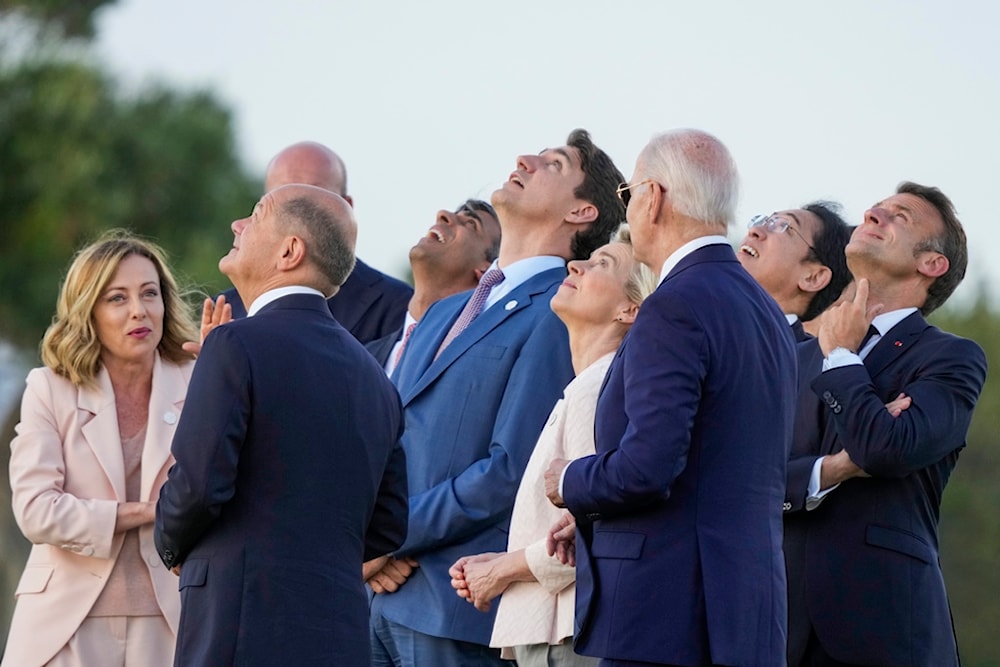West escalates financial warfare against Russia, China: Foreign Policy
The G-7's agenda extends beyond immediate actions, hinting at future measures aimed at isolating Beijing from the global financial system.
-

From right, French President Emmanuel Macron, Japan's Prime Minister Fumio Kishida, U.S. President Joe Biden, European Commission President Ursula von der Leyen, Canada's Prime Minister Justin Trudeau, Britain's Prime Minister Rishi Sunak, European Council President Charles Michel, German Chancellor Olaf Scholz and Italian Prime Minister Giorgia Meloni watch a skydiving demo during the G7 world leaders summit at Borgo Egnazia, Italy, Thursday, June 13, 2024 (Luca Bruno/Domenico Stinellis)
Washington and Western allies have launched a new phase of financial warfare targeting Russia and China, marking a potent yet potentially perilous escalation, an analysis by columnist Michael Hirsh for Foreign Policy details.
Hirsh argues that such measures, including action taken at the recent G-7 summit to redirect billions in frozen Russian assets to Ukraine, alongside fresh sanctions on Chinese banks, could erode the dominance of the US-led international financial system.
This development is seen as potentially satisfying to Russian President Vladimir Putin and Chinese President Xi Jinping, who seek to establish an alternative financial order centered on the renminbi, Hirsh claims.
The G-7's maneuvers signal a departure from traditional norms in international finance, prompting concern among sovereign wealth funds, central banks, corporations, and private investors—especially from vulnerable countries in the global south—that may seek to diversify away from reliance on dollar and euro-denominated assets.
Read more: US should terminate defective counter-terrorism programs in Africa: RS
A senior Biden administration official described the move as unprecedented, noting, "Never before in history has a multilateral coalition immobilized the sovereign assets of an aggressor country and then found a way to unlock the value of those assets for the benefit of the aggrieved party as it fights for its freedom. That’s what happened at this G-7."
But leveraging foreign assets, even those termed by Hirsh as "aggressor" nations like Russia, poses significant risks and sets a precedent that could escalate international tensions. Jon Bateman from the Carnegie Endowment for International Peace noted, "Once a new sanction becomes seen as effective, its usage tends to proliferate," pointing to recent innovations in export controls used against both Chinese and Russian targets.
The G-7's agenda extends beyond immediate actions, hinting at future measures aimed at isolating Beijing from the global financial system. Meanwhile, China has quietly insulated itself from potential financial fallout due to its support for Russia, with major banks reducing exposure to Russia while smaller institutions facilitate trade settlements in renminbi and rubles.
The possibility of freezing Chinese assets in response to geopolitical crises, such as a conflict over Taiwan, raises concerns about systemic financial disruptions and global economic fallout. Unlike the situation with Russia, which required extensive negotiations with the EU to freeze assets predominantly located in Europe, China's vast and globalized asset base presents a tougher challenge under international emergency powers.
The deep economic interdependence between China and the West has deterred complete economic decoupling, reflecting what former US Treasury Secretary Larry Summers termed a "financial balance of terror." This integration complicates the imposition of broad sanctions similar to those imposed on Russia, as Western economies are deeply intertwined with China's economic fabric.
William Reinsch, from the Center for Strategic and International Studies, indicated, "there will be more resistance to imposing the scope of sanctions we have imposed on Russia because Western economies are far more intertwined with China’s than they were with Russia's."
Read more: De-dollarization underway as a result of US policies: Senate candidate
US dominance effort doomed
Earlier today, at the Primakov Readings forum in Moscow, Russian Foreign Minister Sergey Lavrov said that Washington's efforts to sustain its global dominance through political maneuvers are destined to fail, given the increasing number of countries opting for autonomous foreign policies.
"There is no doubt that this course of maintaining hegemony at all costs is doomed to failure. Even if in the foreseeable future the US remains one of the world's centers, and this is likely to be the case, it does not mean that this will happen within the framework of preserving the US-centered world order," Lavrov said at the Primakov Readings forum in Moscow.
The top diplomat also noted that a growing number of countries in Eurasia, Asia-Pacific, the Middle East, Africa, and Latin America are increasingly pursuing independent foreign policy paths, which cannot be overlooked. He added that these countries are gradually freeing themselves from Western influence.
"The outline of a more equitable, multipolar, and polycentric architecture is taking shape before our eyes. And this objective process has accelerated, noticeably accelerated with the start of the special military operation in Ukraine in 2022," Lavrov said.
Earlier this month, Lavrov highlighted that the expansion of BRICS serves as evidence of the ongoing formation of a multipolar world order, where emerging political centers advocate for equality and diversity. This trend persists despite the efforts of the US and its allies to maintain their "elusive dominance."

 5 Min Read
5 Min Read








